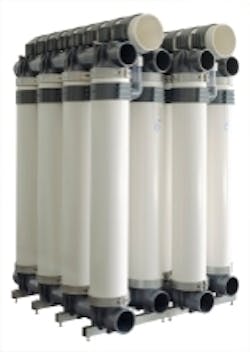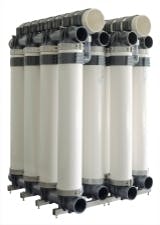Ultrafiltration technology improves water treatment capacity for Turkish steel works
GREIFENBERG, July 28, 2010 -- The German ultrafiltration specialist inge watertechnologies AG has been chosen to provide the filter modules for a large sea water treatment plant that supplies water to a steel works in the Turkish city of Iskenderun on the Mediterranean. In September 2010, the Iskenderun Steel Mill Factory will bring 768 ultrafiltration modules online, providing a treatment capacity of 58,000 m³ of water a day. The dizzer modules made by the German-based technology leader filter the sea water so that it can be desalinated in a downstream RO system and then put to use in the steel production process.
For the Scandinavian company Water Group Finland, which is responsible for building the treatment plant in Iskenderun, the renowned technology leader inge watertechnologies AG from Germany was therefore the obvious choice when it came to the question of who should supply the ultrafiltration membranes.
768 dizzer modules with the patented, German-made Multibore membrane will be supplied to the Iskenderun project together with the "T-Racks," the pre-plumbed and hydrodynamically optimized rack structures also developed by inge. The system will have the capacity to treat some 58,000 cubic meters of water a day and is scheduled to come online in September 2010.
Bruno Steis, CEO of inge watertechnologies AG, is enthusiastic about the project: "The commissioning of this major sea water treatment plant gives us a top-tier reference project in Turkey, which is obviously a fantastic step forward. And it is now set to be followed by a major undertaking in Asia -- we have just received an order in China for a project involving the treatment of some 110,000 m³ of sea water a day. The fact that we are equipping plants of this scale with our technology is further evidence of the solid position that inge watertechnologies AG has now adopted in the premier division of global water treatment specialists."
About inge watertechnologies AG
The company inge watertechnologies AG www.inge.ag, based in the town of Greifenberg near Munich in Bavaria, Germany, employs more than 80 staff and is the world's leading provider of ultrafiltration technology, a membrane process used to treat drinking water, process water, wastewater and sea water.
With a global reach enhanced by its network of partners, the company has completed numerous reference products around the globe featuring its cutting-edge technology. Its range of products include highly-efficient ultrafiltration modules and cost-effective, space-saving rack designs as the core components of water treatment plants, rounded off by the superb technical support it provides to its customers.
All the company's products are based on the in-house development of its patented Multibore® membrane technology, providing the top-quality standards for which German-made goods are famous. The extremely small-pore filters of the Multibore® membrane reliably intercept not only particles, but also microorganisms such as bacteria and viruses, thereby providing a dependable source of clean water. Deployment of the inge technology also offers significant advantages over conventional water treatment methods, such as rapid and easy module installation and stable, highly resilient membranes. This makes planning a water treatment facility much simpler, enabling customers to achieve low-cost installation and operation. And all this comes with a guarantee of long-lasting reliability.
###

